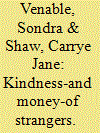| Srl | Item |
| 1 |
ID:
107056


|
|
|
|
|
| Publication |
2011.
|
| Summary/Abstract |
This article compares the rates of intercountry adoption from 26 sending countries of the former Soviet Union and East Central Europe to 25 receiving countries during the period 2000-2006. While our data confirm that countries adopting foreign children have significantly higher incomes than those from which they adopt, they show no significant discrepancy in birth rates between the two groups, with some sending countries actually having lower birth rates than their corresponding receiving countries. We then suggest that high sending rates result, not from a large 'surplus' of children, but from institutions that can connect the sending countries' 'surplus' children with prospective parents in receiving countries, and that the legacies of communist rule include such institutions.
|
|
|
|
|
|
|
|
|
|
|
|
|
|
|
|
| 2 |
ID:
080164


|
|
|
|
|
| Publication |
2007.
|
| Summary/Abstract |
This article analyses the complex interplay between domestic systemic transformations in post-communist Europe and the reintegration of these countries in the global political economy, through a study of the relationship between successive Romanian governments and the international financial institutions in the 1990s. Conceptually, it seeks to overcome the dichotomies of realist and rationalist approaches to international relations by deploying fields, habitus and practices conceptual framework inspired by the work of Pierre Bourdieu. The article captures both the symbolic and material-structural dimensions of the interaction between domestic field-creation and the reproduction of global economic and political fields. It suggests that practices aimed at the reproduction of power hierarchies are also modulated by symbolic requirements, to save face and to avoid whenever possible open conflict, related to the logic of honour
|
|
|
|
|
|
|
|
|
|
|
|
|
|
|
|